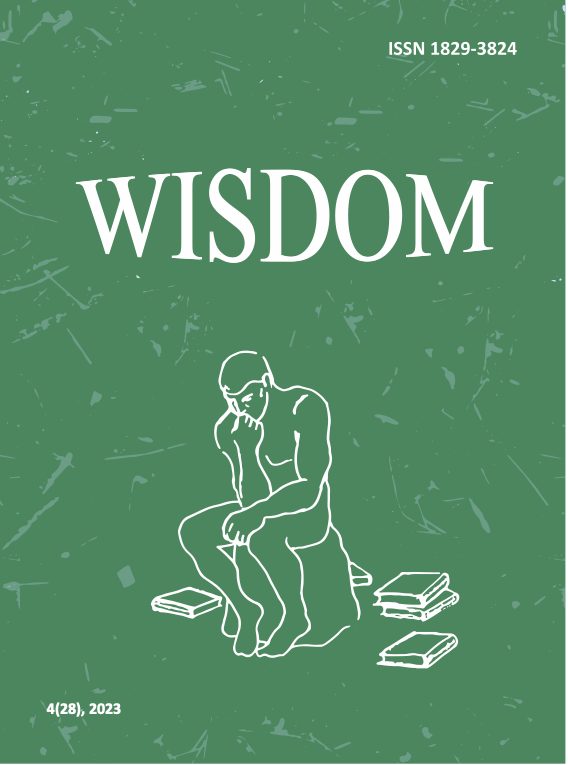The Influence of the Ruling Elite on Political Activity in the Conditions of Destructuring the Essence of the Philosophy of Law
DOI:
https://doi.org/10.24234/wisdom.v1i1.603Keywords:
philosophy, elite, legitimization, destructuring, philosophy of lawAbstract
Different policy actors have different influences on the process. Most do not directly participate in political life: a particular layer of people called the political elite is more likely to get involved in it. From a philosophical point of view, the political elite is mainly defined as a minority of society, a somewhat independent, relatively privileged group (or a set of groups) that has the appropriate psychological, social and political qualities and is directly involved in the formation and implementation of political decisions related to the use of state power or influence on it. The main goal of the article is to characterise the negative influence of the ruling elite on the formation of political activity in the context of revealing its possibilities of destructuring the essence of the philosophy of law itself. The methodology was based on the main historical and theoretical research methods that made it possible to achieve the set goal. As a result of the study, the main elements of the negative influence of the ruling elite were characterised, its place in the philosophy of law was determined and which destructuring consequences it has.
Downloads
References
Lefkowitz, D. (2020). Philosophy and International Law. In Philosophy and International Law: A Critical Introduction (Cambridge Introductions to Philosophy and Law, pp. I-Ii). Cambridge: Cambridge University Press.
Markoff, J. y V. Montecinos (2001): “From the power of economic ideas to the power of economists”, en M. A. Centeno y F. López-Alves (eds.): The other mirror. Grand theory through the lens of Latin America, Princeton University Press, New Jersey, pp. 105-150.
Pakulski, J. (2018). Populism and Political Elites. Zoon Politikon. Special Issue. 1-16. https://doi.org/10.4467/2543408XZOP.18.001.10057
Barr R.R. (2009), Populists, outsiders and anti-establishment politics, “PartyPolitics” Vol. 15, No. 1
Fukuyama F. (2016) Political Order and Political Decay, Farrar, Straus and Giraux, New York.
Zhang, K., & Meng, T. (2018). Political elites in deliberative democracy: Beliefs and behaviors of Chinese officials. Japanese Journal of Political Science, 19(4), 643-662. DOI: https://doi.org/10.1017/S1468109918000270
Aitamurto, T (2012) Crowdsourcing for Democracy: A New Era in Policy-Making. Publications of the Committee for the Future, the Parliament of Finland. Available at https://papers.ssrn.com/sol3/papers.cfm?abstract_id=2716771
Hayo, B and Neumeier, F (2014) Political leaders’ socioeconomic background and fiscal performance in Germany. European Journal of Political Economy 34, 184–205. Available at https://ac.els-cdn.com/S017626801400010X/1-s2.0-S017626801400010X-main.pdf?_tid=067af656-f97c-11e7-9c4e-00000aacb360&acdnat=1515969862_d33260cfe19f083cf47face2fd42cc47
He, B (2018) Deliberative citizenship and deliberative governance: a case study of one deliberative experimental in China. Citizenship Studies Routledge 22, 294–311
Bühlmann, F., Benz, P., Mach, A. and Rossier, T. (2017) “Mapping the Power of Law Professors: The Role of Scientific and Social Capital.” Minerva, 55, pp. 509–531. https://doi.org/10.1007/s11024-017-9333-1
Davoine, E., Ginalski, S., Mach, A. and Ravasi, C. (2015) “Impacts of Globalization Processes on the Swiss National Business Elite Community: A Diachronic Analysis of Swiss Large Corporations (1980–2010),” in Morgan, G., Hirsch, P. and Quack, S. (eds.) Research in the Sociology of Organizations. Emerald Group Publishing Limited, pp. 131–163. https://doi.org/10.1108/S0733-558X20150000043017
Monteath, T. and Schimpfössl, E. (2019) “The Culture of Elite Philanthropy: Russia and Britain Compared,” in Duncan, P.J.S. and Schimpfössl, E. (eds.) Socialism, Capitalism and Alternatives. London, UCL Press, pp. 49-65. https://www.uclpress.co.uk/collections/subject__areastudies/products/111621
Cunningham, N. with Savage, M. (2015) “The Secret Garden? Elite Metropolitan Geographies in the Contemporary UK.” The Sociological Review, pp. 321-348.
Wakeling, P. and Savage, M. (2015) “Entry to Elite positions and the stratification of higher education in Britain.” The Sociological Review, 63, 2, pp. 290-320.
Friedman, S. and Reeves, A. (2020) “From Aristocratic to Ordinary: Shifting Modes of Elite Distinction.” American Sociological Review, 85, 2, pp. 323-350. https://journals.sagepub.com/doi/full/10.1177/0003122420912941
Downloads
Published
How to Cite
Issue
Section
License
Copyright (c) 2021 Author and scientific journal WISDOM

This work is licensed under a Creative Commons Attribution-NonCommercial 4.0 International License.
Creative Commons Attribution-Non-Commercial (CC BY-NC). CC BY-NC allows users to copy and distribute the article, provided this is not done for commercial purposes. The users may adapt – remix, transform, and build upon the material giving appropriate credit, and providing a link to the license. The full details of the license are available at https://creativecommons.org/licenses/by-nc/4.0/.















